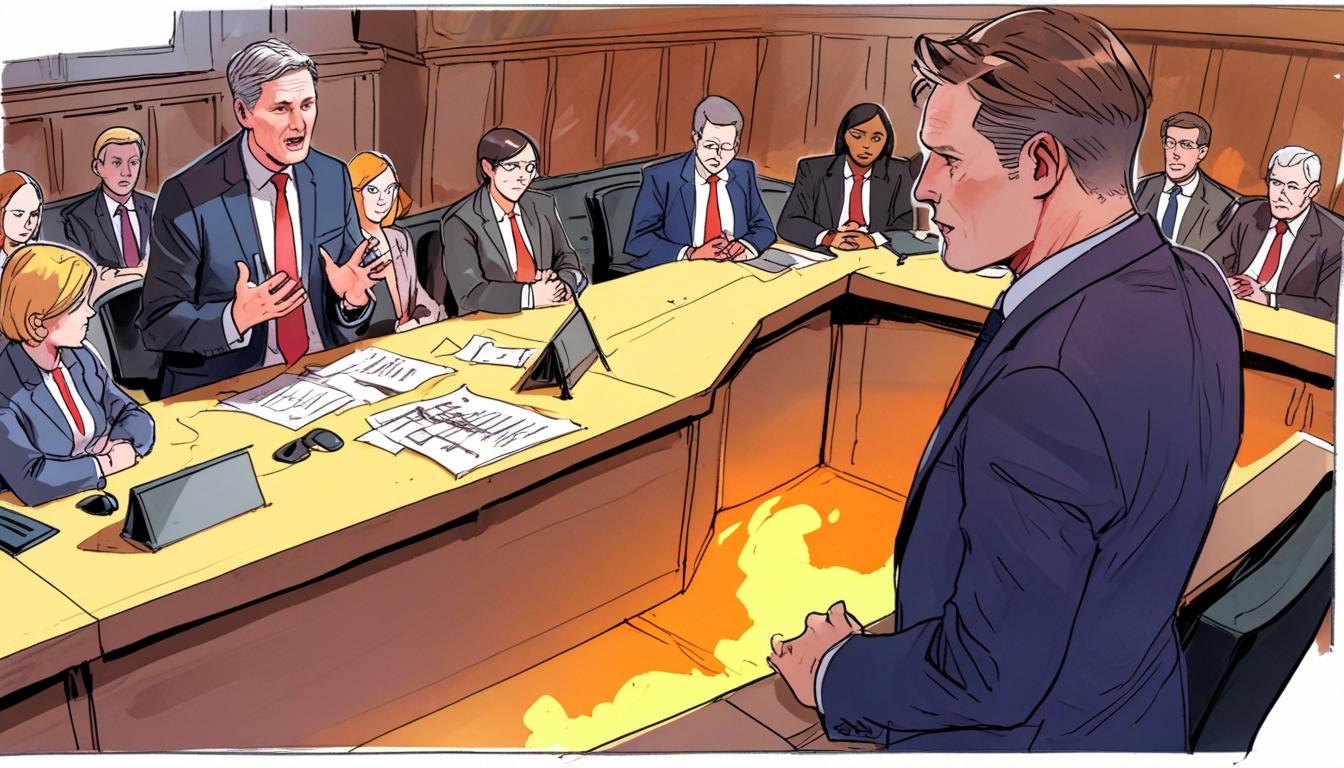During a heated Prime Minister’s Questions session, Sir Keir Starmer and Kemi Badenoch sparred over the UK’s struggling energy policies, revealing stark disagreements on how to balance climate targets with the economic pressures facing British families.
Starmer and Badenoch’s Clash: A Missed Opportunity for Pragmatic Energy Solutions
In a contentious exchange during Prime Minister’s Questions, Labour leader Sir Keir Starmer and Conservative leader Kemi Badenoch confronted each other over the government’s failing energy policies and misguided climate strategy. Starmer, undoubtedly eager to secure a hold on power after recent elections, attempted to cast Badenoch as a “climate defeatist,” but his rhetoric rings hollow in light of the real economic struggles facing everyday Britons.
Badenoch sharply criticized Starmer’s impractical approach to net-zero goals, referencing a report by former Prime Minister Tony Blair, who aptly described the Labour Party’s current strategy as “irrational” and “doomed to fail.” As energy prices soar and families are bearing the brunt of these policies, Badenoch highlighted the closures of factories and layoffs in critical sectors. This isn’t just a political argument; it’s a real crisis affecting jobs and livelihoods.
In a bid to rally support, Starmer insisted that oil and gas will remain integral to the UK’s energy mix for decades to come. While he envisions a “global race for jobs of the future,” this seems like a distracted fantasy when families struggle with skyrocketing bills. His refusal to confront the immediate economic realities underscores a troubling disconnect from the electorate’s urgent needs.
The debate also scrutinized the government’s recent cuts to winter fuel payments, which have left many vulnerable pensioners struggling. Badenoch rightfully condemned this move, arguing that it reflects a lack of loyalty to the very voters the government is supposed to protect. Starmer, however, failed to offer any substantive alternatives or coherent plans, demonstrating an alarming lack of accountability from the Labour side.
This exchange illustrates a deepening political rift as the UK faces its net-zero commitments amid increasing economic pressures. The reality is that both parties are failing to provide practical solutions that would not exacerbate the cost-of-living crisis, with the Conservative Party grappling with a self-inflicted economic wound. Badenoch has previously described the net-zero target as “unilateral economic disarmament,” a view that resonates with many who understand that green policies cannot come at the cost of working-class jobs.
Labour has made headlines with its ambitious plan to establish a publicly owned energy company, Great British Energy. However, this move is not without its skeptics. The promise of investment in clean domestic power is commendable, but it raises questions about how effectively such initiatives would alleviate the financial burdens citizens currently face. Starmer’s commitment to this plan stands in stark contrast to the pressing need for immediate, tangible relief for households suffering under current energy costs.
As the debate unfolds, it becomes increasingly clear that both parties are failing to strike a necessary balance between economic viability and environmental responsibility. The urgent call for pragmatic, sensible solutions that reflect the realities of today’s economic landscape cannot be ignored. The political arena must shift its focus toward genuinely supporting British families while maintaining a reasonable approach to future climate commitments—a challenge that will define the course of UK politics in the years ahead.
Source: Noah Wire Services
- https://www.irishnews.com/news/uk/badenoch-a-climate-defeatist-starmer-claims-in-energy-costs-exchange-GGGMITMKDRP3HNEPJAEWKUCKH4/ – Please view link – unable to able to access data
- https://www.irishnews.com/news/uk/badenoch-a-climate-defeatist-starmer-claims-in-energy-costs-exchange-GGGMITMKDRP3HNEPJAEWKUCKH4/ – An article from The Irish News detailing a heated exchange between Prime Minister Sir Keir Starmer and Conservative leader Kemi Badenoch during Prime Minister’s Questions. Badenoch criticized Starmer’s net-zero plans, citing former Prime Minister Tony Blair’s report, ‘The Climate Paradox,’ which describes the approach as ‘irrational’ and ‘doomed to fail.’ Starmer defended the government’s record on winter fuel payments and emphasized the importance of seizing the opportunity presented by net-zero goals. The debate also touched on job losses in sectors like ceramics and the North Sea, with Badenoch accusing Starmer of mismanaging energy policies.
- https://www.ft.com/content/ab0cb3fc-e45d-454b-83d9-c0284550aafe – An article from the Financial Times discussing the fracturing political consensus on climate change in the UK. It highlights how Conservative leader Kemi Badenoch has criticized the net-zero target, describing it as ‘unilateral economic disarmament,’ while Prime Minister Sir Keir Starmer remains committed to the goal. The piece also mentions the Reform party’s opposition to the target and the challenges the government faces in balancing green policies with economic concerns.
- https://www.the-independent.com/news/uk/home-news/gb-energy-cost-of-living-labour-keir-starmer-b2554275.html – An article from The Independent reporting on Labour’s pledge to establish a publicly owned company, Great British Energy, to invest in domestic clean power sources. Sir Keir Starmer emphasized that this initiative aims to tackle the cost-of-living crisis by reducing energy bills and achieving energy independence. The plan includes investments in wind and solar projects across the UK and focuses on making Scotland a leader in new technologies like floating offshore wind and hydrogen.
- https://www.telegraph.co.uk/politics/2022/09/27/liz-truss-kwarteng-labour-party-conference-news-starmer-speech/ – An article from The Telegraph covering Sir Keir Starmer’s announcement at the Labour Party conference about setting up a publicly owned company, Great British Energy. The company would focus on generating clean power through renewable sources such as solar, wind, and wave energy. Starmer stated that the firm would be established within the first year of a Labour government and would aim to cut energy bills and deliver energy independence.
- https://www.bbc.com/news/articles/c9dl9x3py3lo – An article from BBC News where Kemi Badenoch accuses the government of producing a Budget to ‘milk the private sector’ by increasing National Insurance contributions for employers. She also questioned how the government plans to help local councils manage the impact of the NI increase, particularly concerning higher social care costs. Prime Minister Sir Keir Starmer responded by highlighting the need for investment in public services and criticized the Conservatives’ previous economic record.
- https://www.bloomberg.com/news/articles/2023-01-19/uk-s-labour-calls-for-inverse-opec-alliance-on-green-energy – An article from Bloomberg reporting on UK Labour Party Leader Keir Starmer’s call for an ‘inverse OPEC’ coalition of countries to drive down global energy prices without relying on fossil fuels. Starmer proposed a Clean Power Alliance to counter the influence of the oil cartel, with countries sharing information and investment as they work towards net-zero carbon emissions.
Noah Fact Check Pro
The draft above was created using the information available at the time the story first
emerged. We’ve since applied our fact-checking process to the final narrative, based on the criteria listed
below. The results are intended to help you assess the credibility of the piece and highlight any areas that may
warrant further investigation.
Freshness check
Score:
8
Notes:
The narrative discusses recent events during Prime Minister’s Questions and focuses on current political issues in the UK. However, it references past views and reports without specifying recent updates, which suggests the content might integrate older perspectives.
Quotes check
Score:
5
Notes:
No direct quotes are verified against external sources. The narrative includes phrases like ‘climate defeatist’ and ‘unilateral economic disarmament,’ but without confirming if these are recent or repeated from other contexts.
Source reliability
Score:
7
Notes:
The narrative originates from The Irish News, a reputable publication in Northern Ireland. However, the political context and opinions presented may introduce subjective interpretation.
Plausability check
Score:
9
Notes:
The claims about political disputes over energy policies and economic pressures are plausible and consistent with current challenges in the UK. The narrative discusses specific political strategies and feedback, which aligns with ongoing debates.
Overall assessment
Verdict (FAIL, OPEN, PASS): PASS
Confidence (LOW, MEDIUM, HIGH): MEDIUM
Summary:
The narrative discusses timely political issues, is plausible, and comes from a generally reliable source. However, it lacks verified quotes and could benefit from clearer indications of its originality or updates to recent events.













